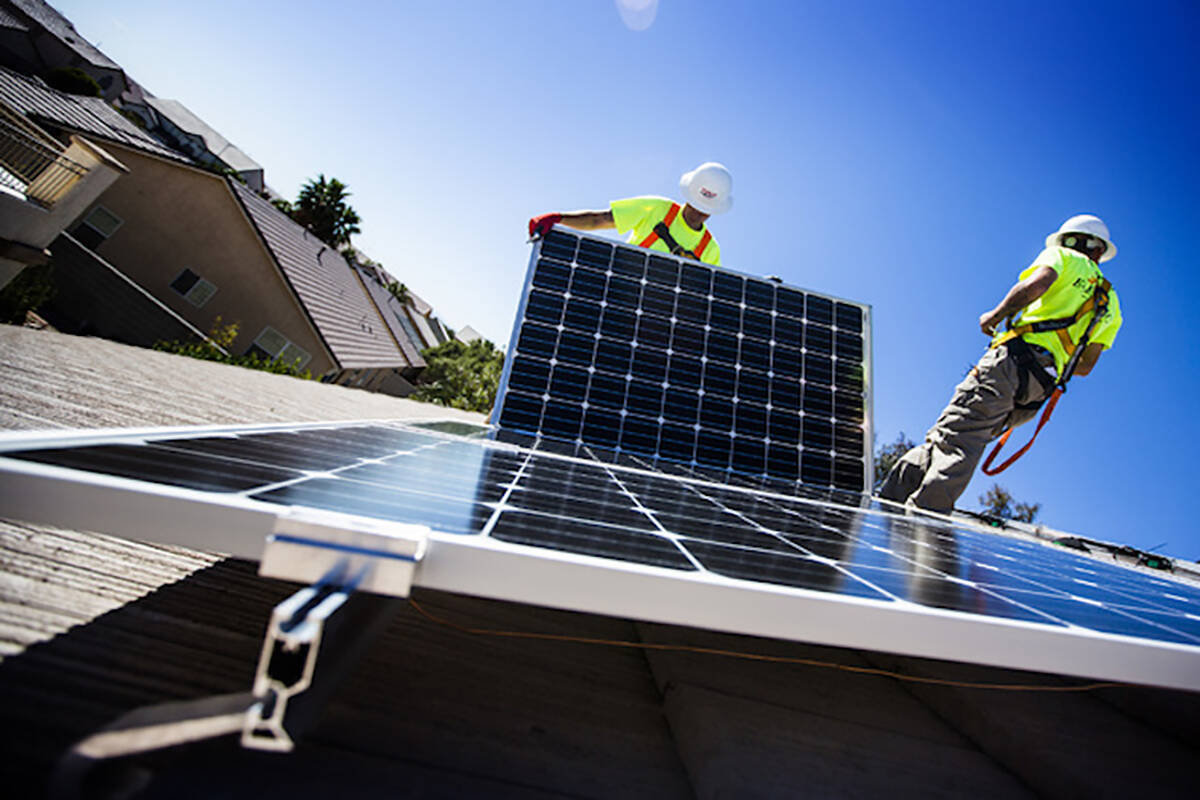NV Energy solar customers could see $20 increase in their utility bill next year
Southern Nevada solar customers’ energy bills will include an extra fee beginning in April.
Over 144,000 Nevada homes have solar panels, according to Solar Energy Industries Association Solar Market Insight report. Those customers, beginning April 16, will see around a $20 increase in their utility bills with the NV Energy’s new demand charge.
On Tuesday, the Public Utilities Commission of Nevada approved NV Energy’s newest proposal: a mandatory daily demand charge for residential and small commercial customers. This is a first-of-its kind fee, with NV Energy becoming the first investor-owned utility to impose a mandatory demand charge on residential and small commercial customers.
How does the demand charge work?
Typically, ratepayers are charged per kilowatt hour or kWh. The demand charge will bill customers based on their highest 15-minute usage of electricity.
For example, a customer could use 8 kilowatts one day between 6:15 p.m. and 6:30 p.m. by running the air conditioner, fans and washing machine all at once. According to the draft order from the PUCN on the demand charge, NV Energy plans to charge 18 cents per kilowatt for residential customers.
So, in multiplying 18 cents by eight, that equals $1.44, which will be the demand charge for that day. At the end of the month, the daily demand charges will be added together to get the total demand charge for the entire month.
Starting April 16, this new line item will be added to customers’ bills, in addition to per kWh usage; however, NV Energy says kWh charges will go down to offset the demand charge pricing.
According to the utility, the new charge would encourage customers to spread energy usage of high-demand appliances, such as clothes dryers and pool pumps, throughout the day. If a customer uses too much energy at one point in the day by using a high-demand item, the demand charge for that day will increase.
How will the demand charge affect solar customers?
When customers install rooftop solar, the sunlight reflected onto the cells is converted into usable energy to be used by the household during the daytime. At night, solar customers pull from the utility’s electric grid.
Through a process called net metering, any excess energy not used by the household is sent back to the electric grid, which is then converted into credits. These credits are put toward their energy bills each month, which can offset the cost of energy used at night or on cloudy days.
Because of this, many solar customers’ utility bills can be lower than non-solar customers, sometimes $0 each month. But every customer, solar and non-solar, pays the mandatory $18.50 service charge each month, covering the cost of connecting the customer to utility service.
With the newly approved demand charge, solar customers are getting a new, unavoidable charge on their bills that net metering cannot offset.
According to David Chairez, former regulatory manager for the Bureau of Consumer Protection, the demand charge could add an average of $20 to NV Energy’s solar customers’ bills.
“So, let’s say I’ve got a 7-kilowatt system, and I’m demanding 7 kilowatts — then I’m really demanding zero,” said Chairez on how solar typically works. “But once the sun sets and my system’s no longer producing, then at that point, my demand is still at 7 kilowatts, and I’m going to pay the demand charge for 7 kilowatts.”
Next year, solar customers must pay the $18.50 basic service charge, however many kWh they used, which is oftentimes $0 due to net metering, and the mandatory demand charge, which net metering cannot be used toward.
“Whatever the demand charge is that they’re going to incur is the additional amount they’re going to pay,” said Chairez.
Many solar groups have admonished the PUCN and NV Energy for imposing the demand charge, calling for the regulatory body to reverse the decision.
Sheila Hallstrom, Nevada regulatory lead at Advanced Energy United, said the demand charge would “unfairly penalize customers who conserve energy or invest in distributed energy resources.”
“This decision undermines energy efficiency and affordability, all at a time when we are in an energy affordability crisis,” said Hallstrom. “Utilities should be incentivizing smart energy choices, not taking them away and punishing customers.”
Wil Gehl, InterMountain West senior manager for the Solar Energy Industries Association, said the demand charge would rewrite the rules for solar customers.
“This is a significant step backward that makes solar less accessible for Nevada families, and we urge the commissioners to change course,” said Gehl. “The draft decision discourages private investment in reliable, affordable, clean energy at a time when the grid needs every electron it can get to power Nevada’s economy.”
Contact Emerson Drewes at edrewes@reviewjournal.com. Follow @EmersonDrewes on X.




















